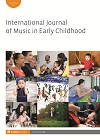
Full text loading...
 , Whitney Mayo2
, Whitney Mayo2
While scholars are interested in parent perspectives on early childhood (EC) music education, the perspectives of first-time attendees and non-maternal caregivers are relatively unexamined. Using phenomenology as both a method and a theoretical frame, we followed ten caregivers (three fathers and seven mothers) as they engaged in their first experience accompanying their children to play-based, child-led EC music classes. Through analysis of pre- and post-interviews, biweekly e-mail check-ins, memos and field notes from observations, we distilled four essences of first-time experience: being family, fitting in, engaging with others and having fun. In this article, we describe each essence and offer interpretation through our lens as mothers, scholars and EC teachers.

Article metrics loading...

Full text loading...
References


Data & Media loading...

Publication Date:
https://doi.org/10.1386/ijmec_00041_1 Published content will be available immediately after check-out or when it is released in case of a pre-order. Please make sure to be logged in to see all available purchase options.